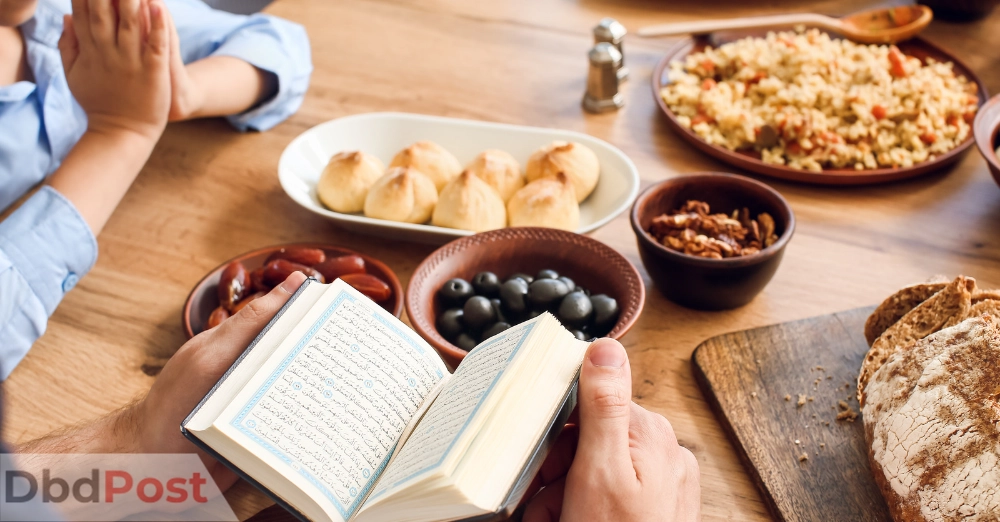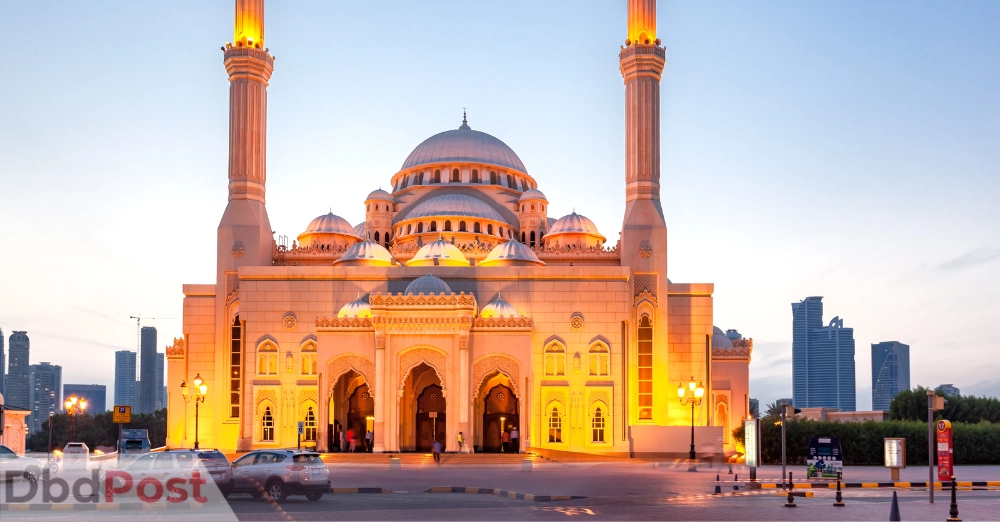Every year, Eid al Fitr in UAE marks the end of Ramadan, a month of fasting. This festival is one of the most significant festivals in the Islamic calendar.
Eid al-Fitr in UAE is a time for Muslims to feast and celebrate, so UAE residents get four days of holiday for the grand celebration. This festival signifies the end of a month-long fasting period for all Muslims. In 2023, the Eid al-Fitr holidays in UAE begin on the 20th of April.
If you want to learn more about the Eid al-Fitr holidays in UAE, then look no further. This Dbd guide has got all the information you need, from dates and history to traditions and everything in between.
Eid al-Fitr date in UAE (2023 to 2026)
While Eid al-Fitr marks the holy month of Ramadan in UAE for one night, the celebration lasts for four days. Muslims worldwide celebrate Eid al-Fitr from the last day of Ramadan to the 3rd of Shawwal.
The dates of Eid al-Fitr in the United Arab Emirates for the years 2023, 2024, 2025, and 2026 are shown below:
| Year | Eid al-Fitr Date in UAE | Day |
|---|---|---|
| 2023 | 21 April | Friday |
| 2024 | 10 April | Wednesday |
| 2025 | 30 March | Sunday |
| 2026 | 20 March | Friday |
Why does the date of Eid al-Fitr differ every year?
The date of Eid al-Fitr changes every year because it is based on the Islamic lunar calendar, which is based on the moon’s cycles. By contrast, the months from January to December are all based on the solar calendar. As a result, the dates between the two systems often conflict.
The Islamic calendar is approximately 11 days shorter than the solar calendar, so the date of Eid al-Fitr moves forward about 11 days each year. For example, Muslims worldwide celebrated Eid al-Fitr 2022 on Monday, May 2nd. However, in 2023 it will be celebrated in the month of April.
This difference can be confusing for those unfamiliar with the Islamic calendar. Still, it is simply a result of how time is measured in different parts of the world.
Eid al-Fitr holidays in UAE
Eid al-Fitr in UAE is a public holiday. To maintain a balance between the private and public sectors, all employees are typically given the same number of Eid al-Fitr holidays in UAE. All schools and universities also remain closed throughout the occasion of Eid al-Fitr in UAE.
The official holiday dates might change each year, but usually, Eid al-Fitr holidays in UAE start on the last day of Ramadan and ends on the 3rd of Shawwal in the Islamic calendar. This means that there is a 4-day break to celebrate Eid. [1]U.ae, “Public Holidays, https://u.ae/en/information-and-services/public-holidays-and-religious-affairs/public-holidays”
The following table shows the holiday dates for Eid al-Fitr in UAE:
| Year | Date |
|---|---|
| 2023 | April 20, April 21, April 22, April 23 |
| 2024 | April 8, April 9, April 10, April 11, April 12 |
| 2025 | March 29, March 30, March 31, April 1 |
| 2026 | March 18, March 19, March 20, March 21, March 22 |
Origin and history of Eid al-Fitr

Eid al-Fitr is one of the biggest holidays in Islam. It celebrates the end of Ramadan, the month of fasting. People worldwide celebrate it with feasts and parties for three days. But where did this holiday come from, and why is it so important?
To understand the origin and history of Eid al-Fitr, we must travel back to the 7th century. Prophet Muhammad himself first started the practice of Eid al-Fitr. At the time, Ramadan was not yet a part of Islamic practice, but Muhammad’s followers sought a way to show their devotion to God.
The festival started in AD 622 after Prophet Muhammad left Mecca and went to Medina. The prophet then told his followers to celebrate two important holidays in his memory. Those two days were Eid al-Fitr and Eid ul-Adha.
Today, around 2 billion people follow Islam and celebrate the holy festival of Eid al-Fitr in UAE, Iraq, Saudi Arabia, India, etc.
Historical facts about Eid al-Fitr
Eid al-Fitr has been celebrated for centuries. Here are some historical facts about it:
- The precise day of Eid al-Fitr may differ by location due to the fact that the start date for any lunar Hijri month is determined by when religious authorities in the region sight the new moon.
- Muslims must pay their Zakat, a religious obligation to donate to the poor, every year.
- Eid al-Fitr is celebrated by both Shia and Sunni Muslims as the end of Ramadan.
- Eid traditions include eating dates, ouzi, kurma, etc.
- The Islamic prophet Muhammad is credited with establishing the holiday of Eid al-Fitr.
How is the Eid al-Fitr festival celebrated?
The festival of the Eid al-Fitr holiday is celebrated with several different traditions. One of the most common traditions is to eat dates. This is because dates were traditionally used to break the fast during Ramadan.
Similarly, another tradition is to give charity to those in need. This is seen as a way to thank God for his blessings.
One of the most significant parts of the Eid al-Fitr festival is prayer. Muslims will gather together at mosques or outdoor spaces to perform Eid prayers.
A sermon typically follows these prayers. After prayer, people will often visit family & friends, exchange gifts, and enjoy festive meals.
Common traditions followed during Eid al-Fitr
- On the first day of Eid al-Fitr, Muslims attend prayer at a local mosque.
- The celebration of the festival includes gift-giving and special dinners.
- Muslims will say, “Eid Mubarak” (blessed holiday) or “Eid Sa’eed” (merry holiday) when greeting one another.
- In several communities, visiting loved ones and friends, eating festive meals, and giving presents are all parts of the celebration.
- Zakat, or the act of giving to those in need, is also a key part of this holiday.
Foods and celebrations during Eid al-Fitr
Eid al-Fitr is a time for feasting. The holiday is celebrated with delicious traditional Muslim cuisine. Traditional Eid foods vary from region to region, but some common dishes include lamb or beef curry, biryani, sheer khurma, and roti (flatbread).
Here’s the list of common traditional food for Eid al-Fitr:
- Slow-cooked Ouzi, mostly in the Middle-East
- South Indian biryani
- Sweet dishes such as halwa (a type of pudding) and sheer khurma (a vermicelli pudding with dates and nuts)
- Phirni, a creamy dessert made with milk, rice, nuts, and spices
- Harees meat porridge, and Machboos with long grain rice
Best places to visit during Eid al-Fitr in UAE

If you’re planning a vacation for the Eid al-Fitr holidays in UAE, you will find many exciting and festive activities to enjoy. One of the most popular places to explore during the Eid al-Fitr holidays in Dubai is the city’s iconic skyline lit up with fireworks.
Here’s the list of top places you don’t want to miss during Eid al-Fitr in UAE:
- Abu Dhabi: It is one of the best tourist attractions, as it offers a wide range of traditional festivities and cultural events.
- Sharjah: You can explore the country’s rich heritage at the Museum of Islamic Civilization, or take in the beautiful architecture of the Al Noor Mosque
- Burj Khalifa: Head to Burj Khalifa, the world’s tallest building, to see the magnificent Eid fireworks display. Furthermore, the light show is a world-famous spectacle that you simply cannot miss.
- Sheikh Zayed Mosque: If you are in Abu Dhabi, you can’t miss the Sheikh Zayed Mosque, which is illuminated with CBD lights during the festival. It is one of the biggest mosques in the world and is very crowded during Eid.
- Al Badiyah Mosque: The Al Badiyah Mosque in Fujairah is a must-see! It is one of the oldest mosques in the UAE and is surrounded by beautiful gardens. The place is not as crowded as the Sheikh Zayed Mosque, so you can have a slightly more peaceful time there.
Are there health benefits of Eid al-Fitr?
Eid is associated with many spiritual aspects, like thanking Allah for his blessings and forgiving one another. While the spiritual aspects of Eid are essential, there are also many health benefits associated with this holiday.
Physical health benefits
Fasting cleanses the human body of potentially harmful poisons, such as viruses and bacteria, that may be stored in fat deposits.
Our body’s natural detoxification mechanism kicks in a while your digestive system is on a month-long renovation. This allows you to continue a healthy lifestyle even after Ramadan.
Mental health benefits
Fasting jumpstarts the brain, causing it to grow and develop new cells. This subsequently hones responses to information in the world around us.
Furthermore, studies show that fasting can make the brain stronger against stress, more flexible towards change, and enhance mood, memory, and learning capacity.
Related Stories
- Read our guide on Ramadan in UAE to know its significance, history, and upcoming dates.
- Eid al-Adha is another major holiday for Muslims. See how Eid al-Adha in UAE is celebrated and what activities to do.
- Believe it or not, Diwali in UAE is celebrated with immense excitement as well! Read our guide to know more.
FAQs
How many days of holiday for Eid al-Fitr in UAE?
Eid al-Fitr in UAE is a four-day public holiday. Both public and private sectors are closed on these days.
What is Eid al-Fitr?
Eid al-Fitr is an Arabic phrase that, translated to English, means “festival of breaking the fast”. It is a Muslim holiday that marks the end of Ramadan, the Islamic holy month of fasting.
Is it Eid al-Fitr or Eid ul-Fitr?
Both Eid al-Fitr and Eid ul-Fitr can be used. While “Eid al-Fitr” is commonly used, some believe that the correct name is actually “Eid ul-Fitr,” but whichever you use, you will not be wrong.
Do Shia Muslims celebrate Eid al-Fitr holiday?
Yes, both Shia and Sunni Muslims celebrate Eid al-Fitr in UAE. However, in Iraq, Shia Muslims observe Eid one day after Sunni Muslims.
Is everything closed during Eid al-Fitr in UAE?
No, not everything is closed during Eid al-Fitr. Most businesses and public institutions are closed but a lot of shops, attractions, etc are still open for tourists and Muslims.
When is Eid al-Fitr 2023?
Eid al-Fitr in 2023 will be celebrated on the 21st of April. It will take place after the month of Ramadan is over.
How many Eid al-Fitr holidays are in UAE for the private sector in 2023?
There are four days of official holiday for both the public and private sectors in 2023. The holidays are from the 20th of April to the 23rd of April.
Final thoughts
Eid al-Fitr in UAE is a special time because of the Islamic religious background of the nation. The holiday gives everyone time for family, friends, and community service. It’s a time to celebrate Allah’s blessings and forgive one another.
Eid al-Fitr holidays in UAE last for four days, as announced by the government. Major cities like Abu Dhabi, Dubai, etc are blazed with amazing lighting on these days.
Apart from spiritual significance, there are many health benefits associated with Eid al-Fitr – both mental and physical. The holiday is also a great opportunity to learn more about Islam and the UAE culture.
We hope you enjoyed learning about this significant Islamic festival and now understand it better.
- 107shares
- Facebook Messenger
About the author
DbdPost Staff is a team of writers and editors working hard to ensure that all information on our site is as accurate, comprehensive, and trustworthy as possible.
Our goal is always to create the most comprehensive resource directly from experts for our readers on any topic.




